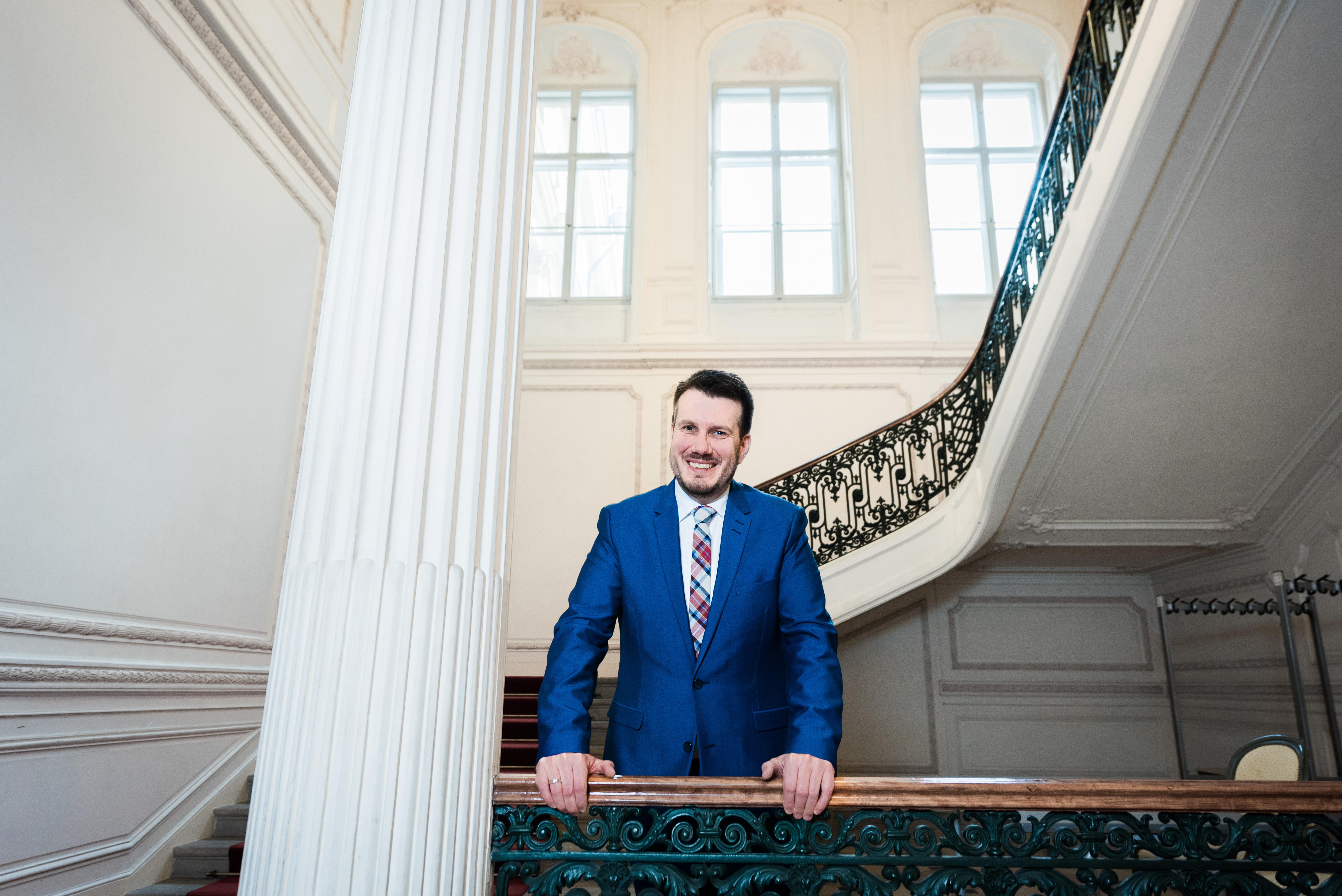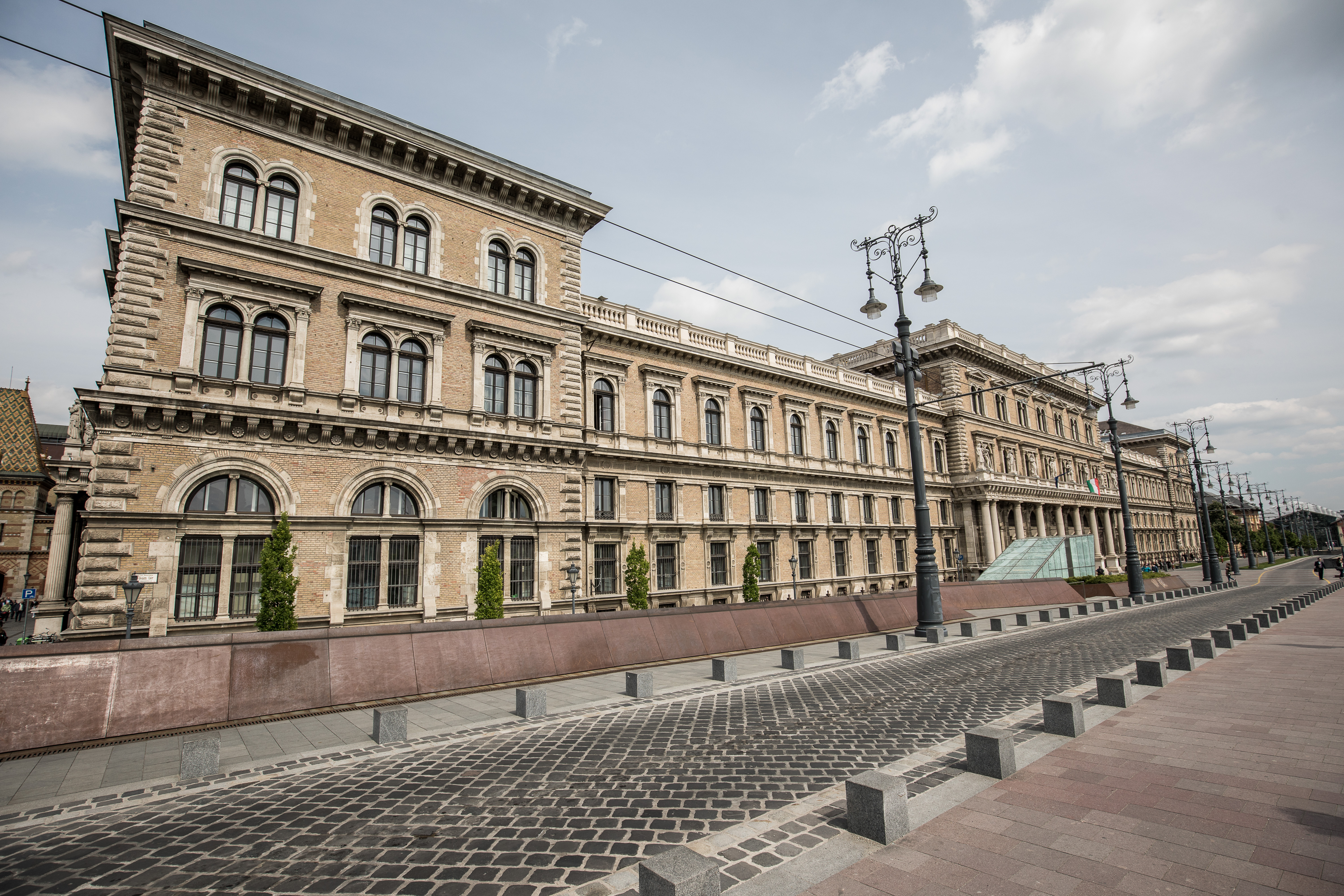“We are fortunate that we can prepare for a big international change ahead of time”
Ákos Domahidi took over the position of Chancellor at the Corvinus University of Budapest on 1 September, having previously held the same position at Andrássy University for 10 years. We talked to him about his initial experiences, the cohesive Corvinus community, sustainability, developments in 2021 and also regarding the details of the recently adopted budget for the subsequent year.

More than three months have passed since your first day at the University. How did you fit in?
I has gone quite smoothly. I am fortunate, as my colleagues welcomed me to Corvinus with open arms and curiosity. During one of my first leadership meetings, I discovered that there is a very cohesive community here that functions almost like a family. I know that a place in this family has to earned, which is not given to me automatically with the signing of my employment contact, but in time I hope to achieve exactly that.
When do you think you will feel that you are a member of the community?
I think I am on the right track, but for that to happen I must spend a whole year in my position as Chancellor. By this I mean a full financial year, intending that I have already managed the planning of the 2021 year, and I must also supervise its implementation.
What were the challenges at Corvinus that made you decide to leave the Andrássy University after 10 years?
I owe a lot to Andrássy University, and I really loved working there, but just like in every persons life, it came time for me to move on. They say that, over a period of 7-9 years all our cells are replaced, which gives a cyclical function to the lives of all of us; and I also feel that it was the appropriate time and occasion for a change. I am a committed believer in Hungarian higher education, and even from the outside I observed the changes initiated at Corvinus with interest. The two main reasons for accepting the proposal of the University were the professionally exciting maintenance and financing scheme existing here, and the particularly ambitious goals set by the leadership of the University for 2030, working towards which gives me extra motivation.
As Chancellor, what are your most important tasks?
We had a saying with the rector of Andrássy University for this: the rector is responsible for the praise, while the chancellor is responsible for the complaints. Joking aside, my primary responsibility is to ensure a balance between financial stability and the budget, which constitutes the basis for the University’s operation. I am responsible, in a broad sense, for ensuring the smooth operation of the institution’s infrastructure, by this I mean the area of IT, the buildings and maintenance.
The chancellery is an internal service provider, which serves the needs of the teachers with tools and assistance during application administration and in other personnel matters. Naturally, in addition to the above, I also have to deal with the legal aspects of the areas I oversee.
As the Chancellor, I also have tasks within the leadership of the University, as together with the chairman, the rector and my other colleagues within the leadership, we must stand our ground in implementing the strategic directions of the reform strategy.
In the areas you oversee, where do you feel you face the biggest challenge during the reform process?
A change in thinking and mentality is required in order to implement the new structure in all areas. It is not easy to leave behind our state maintained past and to understand the operational logic of the new system. A lot of work is still required in order to achieve this, but I work with colleagues who are very open, and who are all capable of holding their own in the new model.
How was the budget for 2021 developed?
This year’s planning process was special because in the first phase, we looked at what expenditure requirements the different organisational units would have without restrictions. This is good to know for ourselves, and the maintainer would also like to see how they should plan for the coming years, how much resources the University needs.
Two principles were key during the process: decentralisation and subsidiarity. Decentralisation, for the involvement of the organisational units in budgetary planning, which have expenses or bring in revenues, in order for their views to also prevail. And subsidiarity, in order to ensure that the actual decision on the amounts to be allocated to the individual organisational units is made by a person who understands the appropriate aspects.
As Chancellor, I participated in most of the meetings, and I learnt a lot about aspects that can occur in relation to the budget of the individual institutes. It also became evident that I would not be the appropriate person to make these financial decisions regarding the individual sub-areas, the deputy rectors and the directors of institutes must also be involved, only in this way, together, after consensus and compromises, can the appropriate solution be found.
It was a positive affirmation that the projected long-term target of 30 billion was reached by the planned spending of the organisational units, which means that if this budget were available, we would already know what to spend it on. This is an important piece of information, because previously the only estimated amount received an empirical confirmation, this way the maintainer is also aware of the goal: over time, the revenue side should also provide this amount in order to achieve the University’s ambitious goals.
What are the key figures in the 2021 budget?
The University has at its disposal a budget of HUF 26 billion, which is an increase of approx. 10 percent compared to the previous year’s budget. For 2021, the University calculates with HUF 16 billion in own revenues, HUF 8 billion in contributions from the maintainer, and HUF 2 billion mobilised by the University from its own revenues.
It is important to note that half of the HUF 8 billion received from the maintaining foundation is put towards the financing of Corvinus Scholarships, with the remaining amount used for investments, further scholarships and the financing of operation.
What investments are expected in 2021 thanks to the increased budget?
In the academic field, the institutional frameworks can manage unprecedented resources, and in the research fields, more resources will be allocated to research promotion and research incubation programmes than before. We would also like to continue the digitisation project started in 2020, this year we took the first steps with the developments in the field of student services and the launch of the MyCorvinus application, but we would like to expand this further, as we still have a lot of ideas to implement, from recruitment to the alumni programme.
I would like to highlight three of the infrastructural developments: in the main building we are renovating the sanitary facilities, in the Salt House architectural and mechanical renovations are expected, and at the Kinizsi College we will carry out an internal mechanical renovation in 2021, and will start replacing the furnaces.

What can the employees of the University expect in terms of wages?
Compared to the previous year, 12 percent more resources can be put towards wages. Part of this will be used to cover the new cafeteria system, which will result in a 5.3 percent increase in total income at the university level. According to our model calculations, in the case of a colleague with a gross income of HUF 300,000, this will result in a 10 percent increase in total net income.
In the first two months of the year, performance evaluations will be carried out in accordance with the new structure, any further wage increases will then be decided by the leadership of the University at the end of February, therefore we ask our colleagues for a little patience in this regard. Of course, the decision adopted at the end of February will be applicable to the whole of 2021, that is, it will also be valid retroactively.
Considering the developments and reform, request from various organisational units have been received for the hiring of a significant number of new colleagues. Similarly, we will be able to decide on efficiency-enhancing issues after the performance evaluations, as we will need to establish the areas where the headcount increase is justified. Realistically, we know that we will not have the opportunity to fill all the positions indicated as requirements, as we would also like to retain our current employees. At the same time, we will examine the areas where we would like to hire additional colleagues.
How do you see the revenue side of the University budget in the medium and long term?
It is an important starting point that there should be a steady and reliable return on the stock packages provided by the maintainer, as this provides a basis for the funding of the University. This will only cover one third of the total University budget, the remaining amount must be generated by the basic operation of the University, with the strategic goal for the next 3-4 years being the laying of the foundation for the University to be able to provide this. The renewed degree programmes and our further developments will bear fruit later, in the meantime we must rely more on the maintaining foundation, of which they are naturally aware.
Of course, the Covid situation has also had an effect on us: although there is no decline, we cannot rely on the growth expected prior to the epidemic. When it comes to the University’s ability to increase revenue, we are preparing to remain at a similar level in the next 1-2 years, and we expect the current investments to be recovered starting from 2023.
As Chancellor, what are your personal goals for 2021?
I would like to change the current practice of employing people with a reduced capacity to work. By law, all workplaces with more than 25 employees must employ a workforce with a reduced capacity to work for at least 5 percent of its positions, otherwise the state obliges them to pay contributions. Until now Corvinus has chosen the latter solution, but for both economic and social reasons, I feel it would be time to change that.
My other goal is to follow the example of leading European universities and focus more on sustainability. At the chancellery, we have already taken steps towards a paper-free office, and this project will continue in the future, but it is worth evaluating how the whole University could develop and become more aware with regard to waste management and energy efficiency.